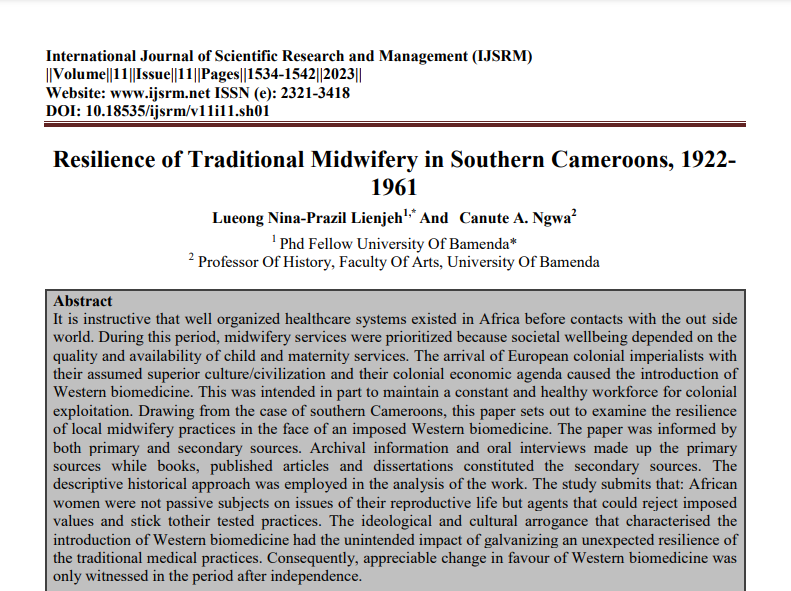
Submission to VIJ 2023-11-04
Keywords
- Resilience, traditional midwifery, southern Cameroons,
- Western
Copyright (c) 2023 Lueong Nina-Prazil LIENJEH, Prof. Canute A. Ngwa

This work is licensed under a Creative Commons Attribution 4.0 International License.
Abstract
It is instructive that well organized healthcare systems existed in Africa before contacts with the outside world. During this period, midwifery services were prioritized because societal wellbeing depended on the quality and availability of child and maternity services. The arrival of European colonial imperialists with their assumed superior culture/civilization and their colonial economic agenda caused the introduction of Western biomedicine. This was intended in part to maintain a constant and healthy work force for colonial exploitation. Drawing from the case of Southern Cameroons, this paper sets out to examine the resilience of local midwifery practices in the face of an imposed Western biomedicine. The paper was informed by both primary and secondary sources. Archival information and oral interviews made up the primary sources while books, published articles and dissertations constituted the secondary sources. The discriptive historical approach was employed in the analysis of the work. This study submits that: African women were not passive subjects on issues of their reproductive life but agents that could reject imposed values and stick to their tested practices. The ideological and cultural arrogance that characterized the introduction of Western biomedicine had the unintended impact of galvanizing an unexpected resilience of traditional medical practices. Consequently appreciable change in favor of Western biomedicine was only witnessed in the period after independence.
References
- Secondary sources
- Allman, Jean. “Making mothers: medical officers and women’s work in colonial Asante 1924-1945”. Oxford Journal, Oxford university press, 1994. History workshop, No 38.
- Aloangamo, Emmanuel. The British Southern Cameroonss, 1922-1961: a study on colonialism and underdevelopment.Madison USA: Nkemnji Global Tech, 2002.
- Andeck, Nwachan, Virginia. “Traditional Midwifery in Batibo: Pre-Colonial- 1992, Trends and Transmutations”. DIPES II Dissertation in History. HTTC Bambili. 2019.
- Ejogha, Nkwam, Florence. “British Medical and Health Policies in West Africa, 1920-1960”, PhD Thesis in history, school of Oriental and African Studies, London University, 1988
- Kiven, Bongaatoh, Bisherine. “Christian Mission Agencies and Mother and Child Welfare Services in British Southern Cameroon: 1922-1961”. MA dissertation in History. University of Bamenda. 2019.
- Nehtegha, Trinidad. “Health Services in the Bamenda Division”. DIPES II dissertation in history, HTTC Bambili. 2014.
- Nyongkah, Rachel. “Traditional Midwifery in the Balikumbat Fondom of the Bamenda grassfields from pre-colonial to post-colonial era”, international journal of humanities and social sciences, Vol. 8, No 3, 2018.
- Rudins, Harri. Germans in the Cameroons 1884-1914, A case study in Modern Imperialism, New York: Greenwood press.
- Takor, Nixon and Nkwain, Clovis. “Herbal potency, ecological threats and changes in medico-spiritual healing of patients in the Kom chiefdom of Cameroon” in Anthony Ikechukwu Kanu (Ed), African Indigenous Ecological systems, 2021.
- National archive Buea
- NAB, 1626, Annual medical report, Southern Cameroons, 1954/1955
- NAB, Sa/e 1936/2, Social Relations with Moslem Chiefs and their Women Folk
- NAB, Sc (1938)4, Medical Practitioners, Native Therapeutics
- NAB, Sc(1944)1, Advisory Committee on Economic Development and Social Welfare, Cameroon’s Provincial Committee For Medical and Health.
- NAB, Sc(1959)2, Annual Medical Reports
- Regional Archives Bamenda
- RAB, NW/sd.1962/1, Annual medical Reports, 1961.
- RAB, NW/sd/a. 1955/5, Native authority Maternity Fee rules, June 1955.
- Oral interviews
- Anna Foncha, Retired Teacher, Foncha’ street, 4th July 2023.
- Bih Helen, famer, Nsem, 9th may 2023.
- Epole Precilia, farmer, Bangem, 16th June 2023.
- Keng Christiana, Native of Alloh village, Hot spot, November 2022
- Lum Magdelene, Native of Mankon, Ntamafeh, November 2022.
- Neh Mbahdeh Margaret, House wife, Mumelah, Bafut, 10th May 2023
- Ngwa Monica Sirri, Native of Bafut Village, Mile 11 Bafut, May 2023.
- Nsahtim Elizabeth kacha, Native of Nwa, on phone, 18th June 2023
- Tamfo Scot, Teacher, mile three Kwen, March 2023.
- Wila Serophine, business woman, Ntarinkon Market, March 2023.
- Wirla Franscica, Farmer, Jakiri 26th June 2023.